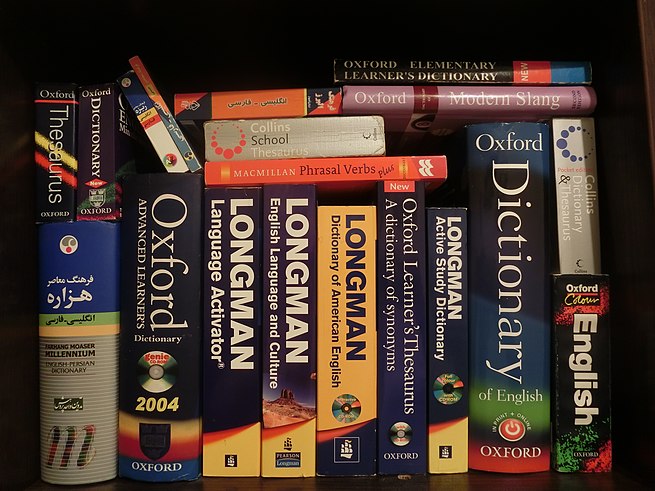
Main Difference
The main difference between Dictionary and Glossary is that the Dictionary is a collection of words and their meanings and Glossary is a alphabetical list of terms relevant to a certain field of study or action.
-
Dictionary
A dictionary, sometimes known as a wordbook, is a collection of words in one or more specific languages, often arranged alphabetically (or by radical and stroke for ideographic languages), which may include information on definitions, usage, etymologies, pronunciations, translation, etc. or a book of words in one language with their equivalents in another, sometimes known as a lexicon. It is a lexicographical reference that shows inter-relationships among the data.A broad distinction is made between general and specialized dictionaries. Specialized dictionaries include words in specialist fields, rather than a complete range of words in the language. Lexical items that describe concepts in specific fields are usually called terms instead of words, although there is no consensus whether lexicology and terminology are two different fields of study. In theory, general dictionaries are supposed to be semasiological, mapping word to definition, while specialized dictionaries are supposed to be onomasiological, first identifying concepts and then establishing the terms used to designate them. In practice, the two approaches are used for both types. There are other types of dictionaries that do not fit neatly into the above distinction, for instance bilingual (translation) dictionaries, dictionaries of synonyms (thesauri), and rhyming dictionaries. The word dictionary (unqualified) is usually understood to refer to a general purpose monolingual dictionary.There is also a contrast between prescriptive or descriptive dictionaries; the former reflect what is seen as correct use of the language while the latter reflect recorded actual use. Stylistic indications (e.g. “informal” or “vulgar”) in many modern dictionaries are also considered by some to be less than objectively descriptive.Although the first recorded dictionaries date back to Sumerian times (these were bilingual dictionaries), the systematic study of dictionaries as objects of scientific interest themselves is a 20th-century enterprise, called lexicography, and largely initiated by Ladislav Zgusta. The birth of the new discipline was not without controversy, the practical dictionary-makers being sometimes accused by others of “astonishing” lack of method and critical-self reflection.
-
Glossary
A glossary, also known as a vocabulary or clavis, is an alphabetical list of terms in a particular domain of knowledge with the definitions for those terms. Traditionally, a glossary appears at the end of a book and includes terms within that book that are either newly introduced, uncommon, or specialized. While glossaries are most commonly associated with non-fiction books, in some cases, fiction novels may come with a glossary for unfamiliar terms.
A bilingual glossary is a list of terms in one language defined in a second language or glossed by synonyms (or at least near-synonyms) in another language.
In a general sense, a glossary contains explanations of concepts relevant to a certain field of study or action. In this sense, the term is related to the notion of ontology. Automatic methods have been also provided that transform a glossary into an ontology or a computational lexicon.
-
Dictionary (noun)
A reference work with a list of words from one or more languages, normally ordered alphabetically, explaining each word’s meaning, and sometimes containing information on its etymology, pronunciation, usage, translations, and other data.
“wordbook”
-
Dictionary (noun)
Any work that has a list of material organized alphabetically; e.g., biographical dictionary, encyclopedic dictionary.
-
Dictionary (noun)
An associative array, a data structure where each value is referenced by a particular key, analogous to words and definitions in a physical dictionary.
-
Dictionary (verb)
To look up in a dictionary.
-
Dictionary (verb)
To add to a dictionary.
-
Dictionary (verb)
To compile a dictionary.
-
Dictionary (verb)
To appear in a dictionary.
-
Glossary (noun)
A list of terms in a particular domain of knowledge with their definitions.
-
Dictionary (noun)
a book or electronic resource that lists the words of a language (typically in alphabetical order) and gives their meaning, or gives the equivalent words in a different language, often also providing information about pronunciation, origin, and usage
“I’ll look up ‘love’ in the dictionary”
“the dictionary definition of ‘smile’”
“the website gives access to an online dictionary”
-
Dictionary (noun)
a reference book on a particular subject, the items of which are typically arranged in alphabetical order
“a dictionary of quotations”
-
Dictionary (noun)
a set of words or other text strings made for use in applications such as spellcheckers
“the worm attempts to crack account passwords using a built-in dictionary”
-
Glossary (noun)
an alphabetical list of words relating to a specific subject, text, or dialect, with explanations; a brief dictionary
“a glossary of Inuktitut words”
